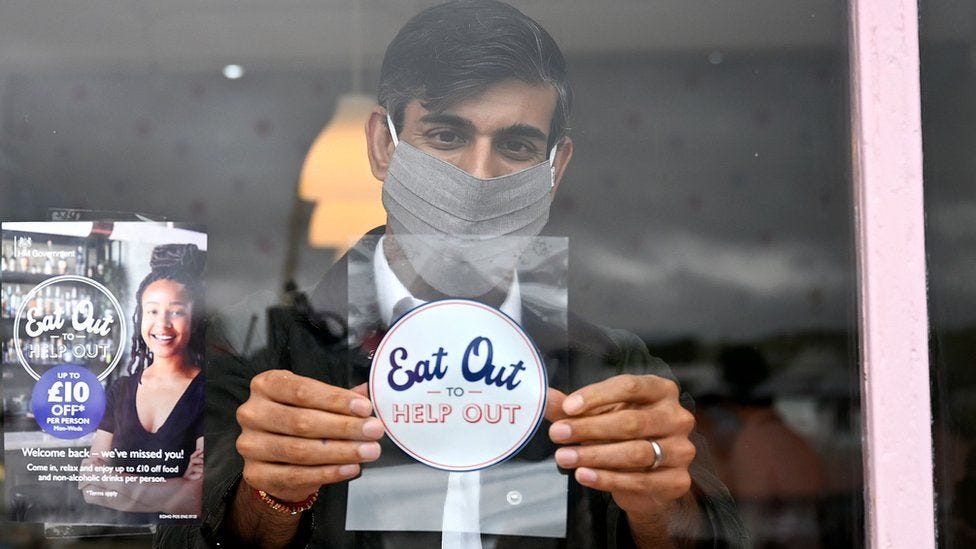Lockdown damage: Rishi Sunak's Silenced Perspective at the COVID Inquiry
At the Covid Inquiry, Sunak wasn't allowed to discuss analysis showing that lockdowns caused more harm than good. They missed the opportunity to genuinely learn lessons from the pandemic.
The Covid Inquiry is incapable of fulfilling its intended purpose: to learn the lessons from the pandemic. After Sunak dared to suggest that lockdowns may have been more harmful than beneficial, he was shut down and the discussion returned to a pursuit of ‘gotcha’ moments. Hugo Keith KC knew that this would mess with the inquiry’s pre-ordained conclusion that lockdown measures should have been stricter and sooner.
The Covid Inquiry
Rishi Sunak cited analysis done by professors of medicine and economics at the University of Manchester and Imperial College London. They did a QALY analysis on the first lockdown in 2020, which suggested that the restrictions were more damaging than beneficial. Chief barrister, Hugo Keith, promptly shut down this claim from Sunak, saying ‘I don’t want to get into quality life assurance models’. He didn’t allow any discussions on the merits of lockdown policy, which defeats the entire purpose of the inquiry.
Watch the video here.
Comically, Keith was mistaken about what Sunak was referencing. QALY actually stands for ‘Quality adjusted life years’, and is a cost-benefit analysis used to assess public health policy. The analysis showed that the lockdowns led to more excess deaths than COVID. The inquiry seems to only be concerned with publicly shaming politicians for not locking down harder and faster in 2020.
At last week’s hearing, Boris Johnson said lockdown was his only tool for dealing with Covid. He also said that at the early stages, he was more concerned about the economic impact of government action, rather than the health risks to the public. This admission was also ignored by the barristers and the media, as it failed to conform to the overarching narrative that lockdown ought to have been tougher and sooner.
Lockdowns
Sunak was right to highlight the harmful consequences of the lockdowns, even if he played a key role in their implementation. People missed funerals and weddings, had fatal illness go untreated, and had to facetime their dying relatives while Downing Street partied away.
Thinking psychologically, lockdowns and government messaging inflated fear levels, and contributed to a mental health crisis. Children felt the effects of lockdown most acutely, as social connection is fundamental to their development. We still don’t truly know the full extent of the impact of lockdowns. The hypotheses are not positive, as it is well known that less socially integrated individuals are more likely to commit suicide, and limited contact with family, friends and co-workers is predictive of earlier death.
What’s worse is the fact that the government knew that Covid wasn’t overly threatening to the majority of the population, and hence they knew they had to exaggerate its danger to ensure compliance with lockdown policies. A government report said explicitly that they should increase ‘the perceived level of personal threat’ that covid posed because ‘a substantial number of people still do not feel sufficiently personally threatened’. The morality rate of Covid was vanishingly low for young people, and elderly people ought to have been shielded more effectively. Unfortunately our government was more concerned with scaring the general population, than protecting the genuinely vulnerable.
Health Secretary Matt Hancock’s WhatsApp messages revealed that he wanted to ‘deploy’ a new Covid variant to ‘frighten the pants off’ the public, ensuring compliance with lockdowns. Cabinet Secretary Simon Case responded to Hancock’s messages, arguing that ‘the fear/guilt factor’ was crucial in ‘ramping up the messaging’.
Not only was our government frightening the public into compliance, but they were also ignoring scientific advice, despite consistently declaring that science directed their policies. When facemasks were made mandatory in English secondary schools, Johnson said in WhatsApp messages that it was ‘not worth an argument’ with Nicola Sturgeon over the issue. Scotland’s First Minister had implemented this measure a week earlier, and the UK government copied this policy, despite the fact that Chief Medical Officer, Chris Whitty, argued that there were ‘no very strong reasons’ to do so.
This doesn’t sound like ‘following the science’ and sounds more like imposing draconian measures on the public with little justification. Johnson’s government led an incoherent and disorganised pandemic response. He had no overarching strategy, and was pulled in all directions by those around him.
Conclusions
Rishi Sunak’s experience at the Covid Inquiry confirms that it is more concerned with embarrassing politicians than genuinely learning lessons from the pandemic. It was more focused on headline grabbing ‘gotcha’ moments over his WhatsApp messages and the Eat Out to Help Out scheme, which actually saved many businesses from destitution.
Not only were lockdowns not necessary, but they were about compliance and control, not protecting the public. The full effects of government restrictions are still not known, but it is indisputable that they were wholly negative. The fact that the Covid Inquiry denied this discussion from materialising shows their pre-ordained conclusion that lockdowns were effective. Politicians should be scrutinised for their conduct, but entire discussions cannot be off limits if we are to truly understand what happened. Unfortunately, those running the inquiry have already concluded that lockdowns should have been tougher and sooner. Sunak’s silencing demonstrates that the entire operation is inadequate, and fails in its purpose to learn the lessons from the pandemic.





